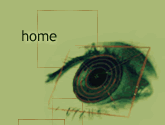|
|
|
|
|
|
|
|
|

|
|
||||||
|
|
|
||||||
|
|
|
|
|||||
|
|
|
||||||
|
|
|
||||||
|
|
|
||||||

|
|
||||||
|
|
|
||||||
|
|
|
||||||
|
|
|
||||||
|
|
|
|
|||||
|
|
|
|
|||||
|
|
|
|
|||||
|
|
|
|
|
||||
|
|
|
||||||

|
Michael: You seem to lead a pretty solitary life these days. I mean, you're no hermit, but you don't get out and about as much, and have a smaller circle of friends than you used to. Some of this might have to do with getting older, but I'm guessing it's partly related to your vision loss. |
|||||
|
|||||
| Michael: Can you say more about how sight loss limits social opportunities? Is it the mechanics of trying to catch the eye of someone you can hardly see, or are there other, more psychological barriers? | |||||
|
Joel: The whole idea of catching someone's eye disappears when you can't see faces. For me, heads are featureless shadows or completely invisible, depending on my angle of view and the light. I can catch a glimpse of hair and facial flesh tone by looking to one side. But neither view reveals a mouth, nose, ears or, yes, eyes. It's surreal, radically alienating, like being the only living thing in a tableau of decapitated George Segal sculptures. A totally blind person might think he was alone, if people made no sound. Myself, I "see" them but can' t, in the customary sense, make out who they may be, and have no idea if they even are aware of me. To be in a crowd is to be alone. So I need introductions, context, conversation, and some description and interpretation from a trusted companion, just to negotiate a cocktail party. |
|||||
|
|
|
|
|
|
|
|

|
|

|

|

|
|
|
|
|
|
|||||
|
|
|
